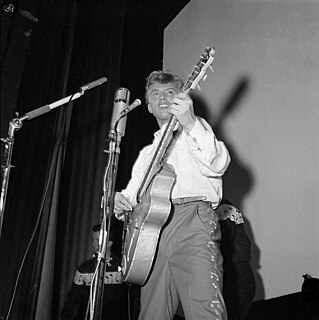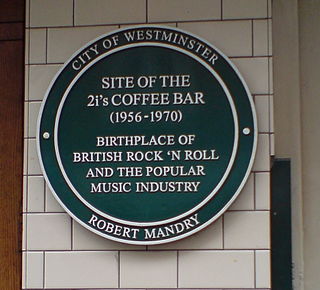Related Research Articles

Soho is an area of the City of Westminster, part of the West End of London. Originally a fashionable district for the aristocracy, it has been one of the main entertainment districts in the capital since the 19th century.

Doris May Lessing was a British novelist. She was born to British parents in Iran, where she lived until 1925. Her family then moved to Southern Rhodesia, where she remained until moving in 1949 to London, England. Her novels include The Grass Is Singing (1950), the sequence of five novels collectively called Children of Violence (1952–1969), The Golden Notebook (1962), The Good Terrorist (1985), and five novels collectively known as Canopus in Argos: Archives (1979–1983).

Bethnal Green is an area in the East End of London 3 miles (4.8 km) northeast of Charing Cross. The area emerged from the small settlement which developed around the Green, much of which survives today as Bethnal Green Gardens, beside Cambridge Heath Road. By the 16th century the term applied to a wider rural area, the Hamlet of Bethnal Green, which subsequently became a Parish, then a Metropolitan Borough before merging with neighbouring areas to become the north-western part of the new London Borough of Tower Hamlets.

Sir Thomas Hicks,, known professionally as Tommy Steele, is an English entertainer, regarded as Britain's first teen idol and rock and roll star. After being discovered at the 2i's Coffee Bar, he recorded a string of hit singles including "Rock with the Caveman" (1956) and the chart-topper "Singing the Blues" (1957). Steele's rise to fame was dramatised in The Tommy Steele Story (1957), the soundtrack of which was the first British album to reach number one on the UK Albums Chart. He starred in further musical films including The Duke Wore Jeans (1958) and Tommy the Toreador (1959), the latter spawning the hit "Little White Bull".

Soho Square is a garden square in Soho, London, hosting since 1954 a de facto public park let by the Soho Square Garden Committee to Westminster City Council. It was originally called King Square after Charles II. Its statue of Charles II has stood since the square's 1661 founding except between 1875 and 1938; it is today well-weathered. During the summer, Soho Square hosts open-air free concerts. Of its 30 buildings, 16 are listed.
Raphael Elkan Samuel was a British Marxist historian, described by Stuart Hall as "one of the most outstanding, original intellectuals of his generation". He was professor of history at the University of East London at the time of his death and also taught at Ruskin College from 1962 until his death.

Fitzroy Square is a Georgian square in London. It is the only one in the central London area known as Fitzrovia.

The 2i's Coffee Bar was a coffeehouse at 59 Old Compton Street in Soho, London, that was open from 1956 to 1970. It played a formative role in the emergence of Britain's skiffle and rock and roll music culture in the late 1950s, and several major stars including Tommy Steele and Cliff Richard were first discovered performing there.
John Mackenzie Calder was a Scottish-Canadian writer and publisher who founded the company Calder Publishing in 1949.

Curtis Brown is a literary and talent agency based in London, UK. One of the oldest literary agencies in Europe, it was founded by Albert Curtis Brown in 1899. It is part of The Curtis Brown Group of companies.
Soho House is a group of private members' clubs originally aimed at those in the arts, politics, and media. The original location is at 40 Greek Street, Soho, London. The company now operates clubs, hotels and venues around the world, and in 2015 changed from SOHO House Group to Soho House & Co. Membership is selective and members are drawn mainly from the media, arts and fashion industries.

The Mike Wallace Interview is a series of 30-minute television interviews conducted by host Mike Wallace from 1957 to 1960. From 1957 to 1959, they were carried by the ABC American Broadcasting Company television network, and in 1959–1960, they were offered by the NTA Film Network.

A Place to Go is a 1963 British crime drama film directed by Basil Dearden and starring Bernard Lee, Rita Tushingham and Michael Sarne. Set in contemporary Bethnal Green in the East End of London, it charted the dramatic changes that were then happening in the lives of the British working class, fitting into the kitchen sink school of film-making which was popular in Britain at the time. The film was based on the 1961 novel Bethnal Green by Michael Fisher.

The Cat's Whisker was a coffee bar situated at 1 Kingly Street, Soho, London, during the mid-late 1950s. It offered London youngsters Spanish dancing, live rock 'n roll, and skiffle.

The Authors' Club is a British membership organisation established as a place where writers could meet and talk. It was founded by the novelist and critic Walter Besant in 1891. It is headquartered at the National Liberal Club.
Carlisle House was the name of two late seventeenth-century mansions in Soho, London, on opposite sides of Soho Square. One, at the end of Carlisle Street, is sometimes incorrectly said to have been designed by Christopher Wren; it was destroyed in the Blitz. The other was the location of Madame Cornelys' entertainments in the eighteenth century and was demolished in 1791; part of the site was cleared in 1891 for the building of St. Patrick's church.

Clayton Littlewood is the author of the book/play Dirty White Boy: Tales of Soho and the sequel, Goodbye to Soho.
Maurice Huggett was the proprietor of a private members club known as the Phoenix Artist Club in Soho, London.
Yet this remarkably warm and welcoming dive is about as far removed from The Groucho, or the rarefied environs of Soho House as it's possible to get... a hive of hangovers, teeming with sozzled actors, out-of-work soap stars, comedians, musicians, writers and assorted hacks, tumbling over one another in a delirious heap, as opposed to engaging in anything so cynical as 'networking'. Mostly because, after a night in the Phoenix, you'd be hard-pressed to remember anybody's name. Through it all, Maurice reigned supreme, dancing, pouting and gliding around the hubbub in a vast and never-ending collection of legendary waistcoats to a piped soundtrack of Fiddler on the Roof, offering advice, comfort, support, and an inexhaustible supply of friendship and queenly asides. In Quentin Crisp's phrase, "one of the stately homos of England".
References
- ↑ Universities & Left Review magazine.
- 1 2 3 4 Thorpe, Vanessa (23 April 2017). "How a Soho coffee house gave birth to the New Left". The Guardian. Retrieved 5 May 2017.
- ↑ "Bishopsgate Institute Podcast: The Partisan Coffee House: Cultural Politics and the New Left. Mike Berlin, 11 June 2009". Archived from the original on 13 November 2013. Retrieved 15 December 2012.
- 1 2 BBC Radio 4 documentary by historian Mike Berlin, 4 December 2008 20:00-20:30
- 1 2 Berlin, Mike (2017). The Partisan Coffee House. Bethnal Green, London: Four Corners. ISBN 9781527209039.
- ↑ Miles, Barry (2010). London Calling: A Countercultural History of London since 1945. London: Atlantic Books Ltd. p. 118. ISBN 9781848875548 . Retrieved 26 March 2018.